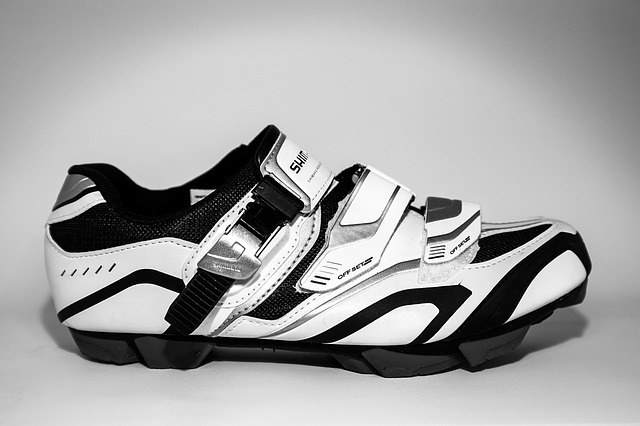If you are an amateur cyclist that just rides of pleasure occasionally, just about any shoes will do. But if you are an aspiring cyclist, you commute by bike, or you are looking to develop within the sport, your choice of shoes is important.
On the whole, cycling shoes are stiffer than traditional athletic shoes. When you try them on, you might feel that your heel slips around a bit within the shoe. This is normal and is a result of the stiffness of the shoe. Also, keep in mind that unlike other shoes that break in with use, cycling shoes don’t really move much from their original shape. Don’t buy a pair that seems a little snug thinking they will break in and feel better with a bit of use, because it probably won’t happen.
Cycling shoes vary based on their style, with different shoe designs for road biking, mountain biking, and city biking.
Road Bike Shoes
Road bike shoes have stiff soles and are very lightweight. They are designed for an optimum transfer of power between your body and the pedals. Even though these shoes look similar to other athletic shoes, they aren’t great for walking long distances. Road bike shoes offer little traction and their inability to flex with your foot can lead to foot strain.
For a free legal consultation,
call 1-844-242-9253
Mountain Bike Shoes
Mountain bike shoes have a stiff sole, though they are generally more flexible than road bike shoes. They have a rubber lug outsole and provide good traction for walking, including on slick or muddy surfaces. Generally, the cleats are recessed in the soles. This further aids in the ability to walk in these shoes, and some road bikers will select these over shoes specifically designed for road bikers for just this reason.
The shoes may secure with laces, cam straps with buckles, or a Velcro system. Try on shoes with several different styles of closures to best determine which shoes work for you. If you select a pair with laces, keep in mind that you will need to tuck the laces in before you ride.
City Bike Shoes
City bike shoes are great for recreational cyclists or indoor cycling classes. These shoes are a mix between traditional cycling shoes and sports shoes, so you will find that they offer a smooth transition on and off the bike. They work well with a clipless pedal system and have recessed cleats, so they won’t interfere with walking.
Finding the Right Fit
Don’t be afraid to try on a number of different cycling shoes before you find the right one. A few things to keep in mind:
- Cycling shoes won’t stretch or “wear in” much, so find shoes that fit well right away.
- Shoes that fit snugly will allow for better energy transfer, but remember that your feet may swell a bit as you ride, so it’s best to allow a little give.
- Factor in the socks you wear when you ride. Wear those socks when you try on cycling shoes.
- Cycling soles are stiff, and this can lead to a feeling of slippage in the heel. This is normal, but if it feels insecure or too loose, choose a different pair.
- If you suffer from foot pain or any of a number of foot disorders, you may need to have orthotics made to better support your feet. In that case, choose a pair of shoes with removeable insoles.
The most important thing to remember about shopping for cycling shoes is that you simply must try them on. You might find a number of great looking styles online, but until you get your foot in that shoe, you won’t know how they will fit.
I purchased a pair of shoes from a reputable brand and wore them out- they fit well, I performed well in them, and I had no foot numbness or irritation that I sometimes experience with other shoes. I reordered the exact same pair online (same style, size). And… they weren’t the same. They never did fit well, and I ended up putting them in the back of the closet as a backup pair. It goes to show- the best way to know the shoe is to try it on.
At Kass & Moses, we love to share our knowledge of cycling. As professionals, we defend cyclists who have been injured in crashes. But when we aren’t working, we are often riding. Our love of cycling is true- and that’s why we feel so passionate about helping injured cyclists. If you or a loved one have been hurt in a bicycle crash, contact us to learn more about how we can help you.
Call or text 1-844-242-9253 or complete a Free Case Evaluation form


